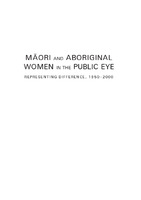Maori and Aboriginal Women in the Public Eye
Representing Difference, 1950 - 2000
Abstract
From 1950, increasing numbers of Aboriginal and Māori women became nationally or internationally renowned. Few reached the heights of international fame accorded Evonne Goolagong or Dame Kiri Te Kanawa, and few remained household names for any length of time. But their growing numbers and visibility reflected the dramatic social, cultural and political changes taking place in Australia and New Zealand in the second half of the twentieth century. This book is the first in-depth study of media portrayals of well-known Indigenous women in Australia and New Zealand, including Goolagong, Te Kanawa, Oodgeroo Noonuccal and Dame Whina Cooper. The power of the media in shaping the lives of individuals and communities, for good or ill, is widely acknowledged. In these pages, Karen Fox examines an especially fascinating and revealing aspect of the media and its history — how prominent Māori and Aboriginal women were depicted for the readers of popular media in the past.
Keywords
australia; social conditions; history; maori women; public opinions; new zealand; aboriginal australian women; Evonne Goolagong Cawley; Indigenous Australians; PakehaDOI
10.26530/OAPEN_459367OCN
759394627Publisher
ANU PressPublisher website
https://press.anu.edu.au/Publication date and place
Canberra, 2011Classification
History


 Download
Download Web Shop
Web Shop